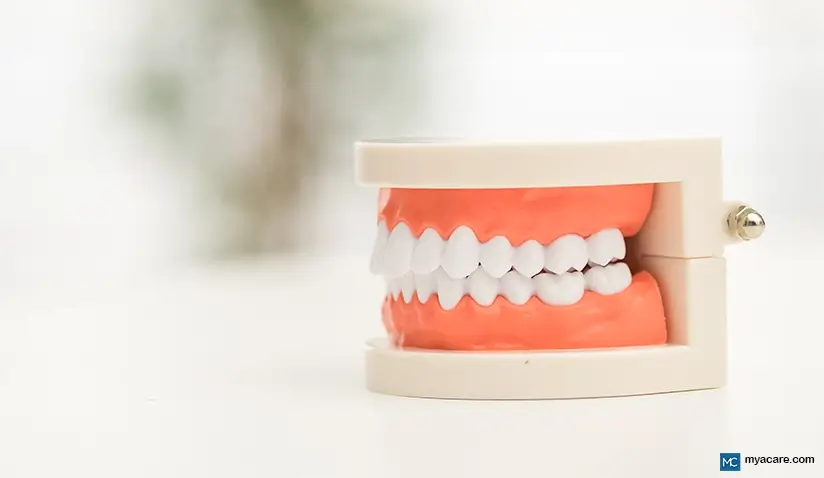Should I Remove My Wisdom Teeth?

Wisdom teeth are the last set of permanent teeth to erupt in the oral cavity. Individuals usually have four wisdom teeth present at the back of the mouth. Every year, 5 million Americans get their wisdom tooth removed, incurring a total cost of 3 billion USD. Removal of wisdom teeth is recommended if they develop decays, gum infections, cysts, or tumors. However, some dentists advise early removal of asymptomatic wisdom teeth to avoid the risk of disease or complications. Early removal of wisdom tooth is controversial with opinion divided on whether or not it should be removed. In this article, we discuss when and why wisdom teeth should be removed.
What is the age for wisdom teeth to grow?
Wisdom teeth (also known as third molars) erupt at the age of 17-21 years. As they erupt at a mature age, these are known as wisdom teeth.
What are impacted wisdom teeth?
Usually, wisdom teeth erupt completely in the mouth. In 36-59% of individuals, the wisdom teeth remain under the gumline, within the underlying soft tissue or bone. Wisdom teeth that fail to erupt entirely in the oral cavity are known as impacted teeth.
As humans evolved, the size of our jaws reduced. This led to insufficient space for third molars, leading to partial or no eruption. Today, even if wisdom teeth erupt completely, they remain less functional due to a shift from uncooked raw foods to softer diets and cooked food.
How different is removal of completely erupted wisdom tooth from partially erupted one?
Removal of a completely erupted tooth is a simple procedure. In contrast, removing a partially erupted tooth (impacted tooth) is a surgical procedure that includes cutting of gums, drilling of bone, and stitching back of gums. The surgical procedure requires more time and effort, so the cost of removing impacted wisdom tooth is high. For instance, in the US, the average cost of simple wisdom tooth removal is $75–$200, while the cost of removing an impacted wisdom tooth is $225–$600. In India, the cost of wisdom tooth removal varies from INR 700 (~US$10) to INR 10,500 (~US$150). The cost depends on position of the wisdom tooth and ease of removal.
When to get the wisdom tooth removed?
Below are some of the conditions when wisdom tooth removal is recommended:
- Acute or recurring episodes of pericoronitis (inflammation or swelling in the gums around partially-erupted third molars) resulting in pain, swelling, and fever.
- Presence of inaccessible, deep, and unrestorable decay.
- Loosening of the third molar due to periodontitis (gum disease).
- Difficulty in maintaining oral hygiene due to inaccessible third molar.
- Presence of cyst or tumor associated with the tooth.
- Third molar causing decay or resorption of adjacent tooth roots.
- Interference of third molar in the orthodontic (braces) treatment or jaw surgery.
Why is early removal of an asymptomatic wisdom tooth recommended?
Some dentists recommend early removal of third molars as a preventive measure to reduce the risk of future complications. Below are some of the reasons for the early removal of the third molar:
- Impacted third molars pose a high risk of developing infections, cysts, tumors, or any other lesion.
- Early removal of the third molar is less painful and may become complicated with aging.
- The pressure exerted by erupting third molars in the oral cavity may cause crowding (misalignment) of front teeth.
- With aging, third molars tend to pose a high risk of disease.
Why is retaining asymptomatic wisdom tooth recommended?
Some scientific researchers support retention of asymptomatic wisdom teeth. Below are a few reasons:
- Removal of impacted wisdom tooth is associated with several complications such as pain, swelling, infection, nerve injury, and decreased mouth opening.
- It can be an unwanted expense.
- Crowding (misalignment) of front teeth cannot be directly attributed to eruption of wisdom teeth. It also depends on discrepancies in tooth size and dental arch width.
However, in patients undergoing chemotherapy, radiotherapy or organ transplants, heart valve surgery, early removal of the asymptomatic wisdom tooth may be recommended. This is to reduce the chances of developing any infection around the tooth.
Should I retain or remove my wisdom tooth?
Wisdom teeth that are completely erupted, healthy, cavity-free, and surrounded with healthy gums should be retained. Such wisdom teeth usually do not require early removal. However, impacted wisdom teeth require regular monitoring by your dentist to eliminate the risk of potential problems. Practice good oral hygiene which includes regular brushing and flossing of teeth to minimize the chances of tooth infections.
To search for the best dentists in India, Malaysia, Singapore, Spain, Thailand, Turkey, the UAE, UK and the USA, please use the Mya Care search engine.
To search for the best healthcare providers worldwide, please use the Mya Care search engine.

Dr. Shilpy Bhandari is an experienced dental surgeon, with specialization in periodontics and implantology. She received her graduate and postgraduate education from Rajiv Gandhi University of Health Sciences in India. Besides her private practice, she enjoys writing on medical topics. She is also interested in evidence-based academic writing and has published several articles in international journals.
Sources:
Featured Blogs



